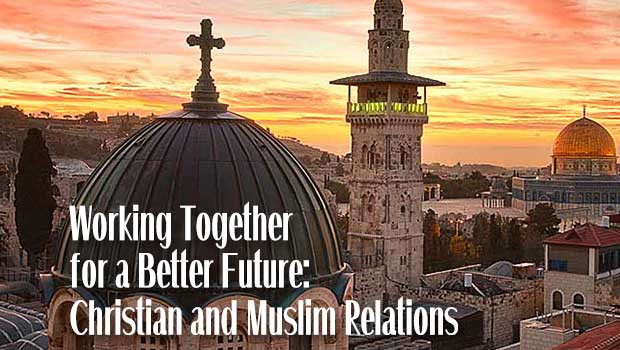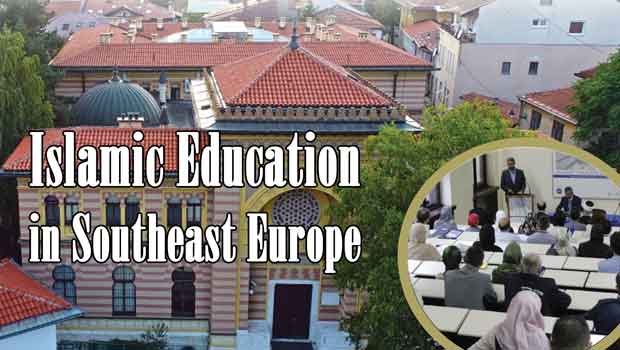“Say [O Muhammad]: ‘O people of the Scripture (Jews and Christians),come to a word that is just between us and you, that we worship none but Allah, and that we associate no partners with Him, and that none of us shall take others as lords besides Allah.’ Then, if they turn away, say,‘Bear witness that we are Muslims’” (Quran 3:64).
Islam teaches that all the prophets, including the Hebrew prophets up to, and including, Jesus, taught the same core message – the oneness of God (without partner or anything associated with Him), the proper worship of Him, accountability for one’s actions with belief in a Day of Judgment, and the way to live a pious life. Jesus was sent to the lost sheep of the children of Israel, and Muhammad came to confirm his teachings, and to serve as the vehicle for the revelation of Quran, the last scriptural testament of God, a timeless and universal divine book for all humanity.
Islam teaches that all the prophets, including the Hebrew prophets up to, and including, Jesus, taught the same core message – the oneness of God (without partner or anything associated with Him), the proper worship of Him, accountability for one’s actions with belief in a Day of Judgment, and the way to live a pious life
God promised that this final revelation would be incorruptible and as such, its miracle lives on through various media – printed, memorized, recited, and taught by multitudes of people in all corners of the earth. The Quran mentions previous prophets and messengers, each preaching to a specific group of people, all of whom were,overall,rejected by their own people but still gained many supporters. They performed miracles in the name of God as proof of their prophethood, and they exemplified piety and good manners. The influence of Prophet Jesus and Prophet Muhammad was so great that their followers combined make up more than half of today’s world population. According to the Pew Research Center on Religion and Public Life, “As of 2010, Christianity was the world’s largest religion, with an estimated 2.2 billion adherents, nearly a third (31%) of all 6.9 billion people on Earth. Islam was second, with 1.6 billion adherents, or 23% of the global population.”
Differences and Commonalities Between the Two Faiths
The Christian creed today, according to Muslim belief, has emerged from a long history of modifications and alterations from the original teachings of Jesus. The most significant difference now existing between the two faiths is the Islamic concept of unity (tawheed) and the Christian concept of trinity, that God is a three-fold God – the Father, the Son, and the Holy Spirit(some Christian sects such as the Unitarians believe in tawheed, but they are in the minority).Regarding what was taught by Jesus, the Quran says, “And when Allah says: O Jesus, son of Mary! Did you say unto mankind: Take me and my mother for two gods beside Allah? He says: Be glorified! It was not mine to utter that to which I had no right. If I used to say it, then You knew it. You know what is in my mind, and I know not what is in Yours. Lo! You, only You, are the Knower of things hidden” (Quran 5:116).
At the same time, Christianity and Islam have many commonalities of belief. Both Christians and Muslims believe in the miraculous birth of Jesus Christ, peace be upon him, in the pious nature of his mother, Mary, in the miracles he performed in God’s name, in his ascension, and both are awaiting his second coming during which he will kill the Antichrist and unify the believers under one banner. Numerous verses of the Quran speak about the life of Jesus and his role as one of the mightiest Messengers of God. There are three chapters in the Quran dedicated exclusively to his legacy: Chapter 3, The Family of Imran (the father of Mary), Chapter 19, Mary, and Chapter 5, The Table Spread, which talks about what is known in Christianity as the Last Supper.
Toward Greater Understanding and Cooperation
The World Council of Churches (WCC) published a report in January 1992 which stated, “Christian-Muslim relations have a complex history sometimes marked by rivalry or war, but equally in many cases – though frequently forgotten – characterized by constructive living together. A striking feature of our historical memories has been the way in which conflicts overshadow the peaceful experiences. This has been paralleled at the level of theological thinking, where polemics drown the voices of frank and honest interchange.”Interfaith activists today work hard to generate greater understanding and cooperation among the various faith communities. In fact, Muslims in the U.S. continue to enjoy a generally prevailing harmony within their communities, workplaces, and educational institutions, living side by side with people of all faiths.With regard to Christians, the Quran says, “You will find the nearest in love to the believers (Muslims) those who say, ‘We are Christians.’ That is because among them are priests and monks, and they are not proud’” (5:82).
Much of the Islamophobic feeling comes from lack of familiarity with Islam and Muslims, or being fed inaccurate information by demagogues and self serving propagandists
The scholar Ibn Kathir said in his explanation of this verse that it“…refers to those who call themselves Christians, who follow the religion of the Messiah and the teachings of his Gospel. These people are generally more tolerant of Islam and its people, because of the mercy and kindness that their hearts acquired through part of the Messiah’s religion. In another Ayah, Allah said; ‘And We ordained in the hearts of those who followed him, compassion, mercy, and monasticism…’ (57:27). In their book is the saying; ‘He who strikes you on the right cheek, then turn the left cheek for him.’ And fighting was prohibited in their creed… This describes them with knowledge, worship and humbleness, along with following the truth and fairness.”
Christian Support and Protection of the Early Muslims
It was a Christian who first confirmed the truth about what Muhammad, peace be upon him, had witnessed on the Mountain of Hira. When he thought he was going mad, his wife reassured him saying that God could not possibly forsake a person who was so trustworthy, generous, and caring. However, it was her cousin, Waraqah ibn Nawfal, a Christian convert, with whom they consulted about the appearance of the Angel Gabriel, and who confirmed that Muhammad had been chosen by God as a prophet. He predicted that he would be driven out of Makkah and that his own tribe would fight against him.
The Muslims faced persecution in Makkah from the very advent of Islam. The leaders of the tribe of Quraysh who opposed Prophet Muhammad used to constantly defame him and even perpetrate acts of violence against him and his companions. Because Makkah was a trade center and housed the Kaaba, where pilgrims from all over Arabia would travel, the Quraysh leaders would unleash their arsenal of anti-Muslim propaganda on the unwitting travelers, many of whom would believe them and continue to spread their rumors amongst themselves and other tribes.
Nevertheless, a good number of these visitors to Makkah also came across Muslims or even the Prophet himself, and after learning about their religion and witnessing their goodness in word and deed, they would embrace it wholeheartedly and reject the character attacks on Prophet Muhammad. These converts would return to their lands or tribes and inform their families and tribesmen about the peaceful message of Islam and the exemplary character of its leader, allowing them to formulate their own opinion about the religion, based on facts.
When the persecution of Muslims in Makkah became unbearable during the early period of Islam, when its message was just beginning to spread more broadly, Prophet Muhammad instructed his followers to seek refuge in Abyssinia, a land ruled and inhabited by Christians. He described the king, Ashama al Negashi, as a righteous man who would not wrong them. The Muslims fled from the Arabian Peninsula into Abyssinia, now Ethiopia and Eritrea, and were well-received by the Christian ruler, who promised them safety and protection. In turn, the Muslims lived in the land abiding by its laws and interacting peacefully with its inhabitants, never imposing on anyone their beliefs.
However, the Quraysh of Makkah were afraid that the Muslims would grow in number and attempt to fight them later after gaining momentum. They sent delegations to try and convince the king to hand over the Muslims so they could be taken back to their homeland and dealt with by the Quraysh. The Muslims living in Abyssinia handled the situation with sincerity and honesty by explaining their belief system to Al Negashi and also informing him that they, too, believed in the message of Jesus Christ and in his miraculous birth. They recited to him verses from the Chapter Mary in the Quran; this moved the ruler to tears, and instead of him focusing on the differences between the two religions, it made him stand firmly on the side of the Muslims against the idolaters.
Living Islam Outwardly and Inwardly
There is much hatred spewed toward Muslims and Islam today, a result of sociopolitical events and dynamics. The September 11 attacks on the World Trade Center in 2001 and the subsequent establishment of the “War on Terror,” the continuous presence of the United States military, along with the armed forces of its allies, in predominately Muslim lands, the rise of so-called Islamic terrorist groups with agendas contrary to Islamic teachings, bigoted right-wing individuals and groups spreading fear and insecurity among the masses, biased media coverage, and the occupation of Palestine and the ensuing violence that results when one group occupies and colonizes another’s land – all contribute to this growing animosity. Much of the Islamophobic feeling comes from lack of familiarity with Islam and Muslims, or being fed inaccurate information by demagogues and self-serving propagandists.
Many American Christians are surprised to learn that believing in Jesus is an integral part of Islam. It is imperative that Muslims do their part to inform others about Islam, in an accurate and positive way. Interacting with Christian and other neighbors, coworkers, peers, and community members in an exemplary way, and being an active, contributing member of the society makes a huge impact. Islamic dawah, inviting others to Islam, is about more than just calling people to the religion vocally.It is also about living Islam outwardly and inwardly. A compelling example of reaching out with patience and piety to those who hate is what happened on the weekend of October 10 when anti-Muslim protests outside mosques were organized across the country. One woman alone turned up for the protest in Dearborn, Ohio. A few Muslims tried to engage her in conversation and explain that her negative perceptions of Islam were inaccurate. At one point, she said “If you’re a Muslim I can’t be friends with you then.” She also said that she did not believe that there are any moderate Muslims. After much discussion, the Muslims invited her into the mosque to eat breakfast with them. She finally agreed and when she later left, she took selfies with her new Muslim acquaintances. A photo of her and a Muslim woman hugging went viral.
Ignorance about Islam and Muslims will continue to fuel hatred. Reaching out to those who react out of their fear can extinguish their enmity and build bridges of mutual understanding and fellowship.
“You shall certainly be tried and tested in your wealth and properties and in your personal selves, and you shall certainly hear much that will grieve you from those who received the Scripture before you and from those who ascribe partners to Allah; But if you remain patient in adversity and conscious of Him, and pious,then verily, that will be a determining factor in all affairs” (Quran 3:186).






